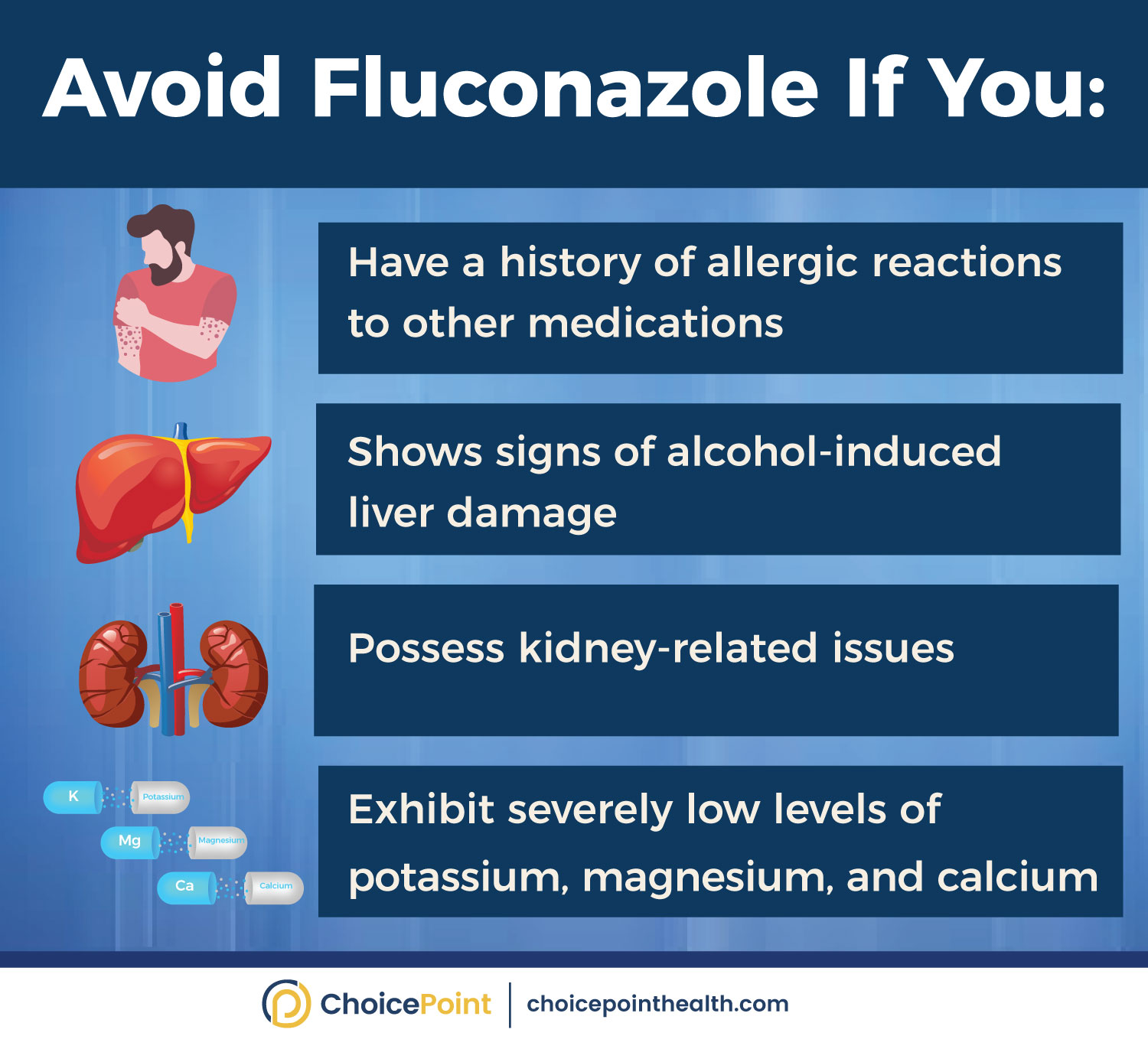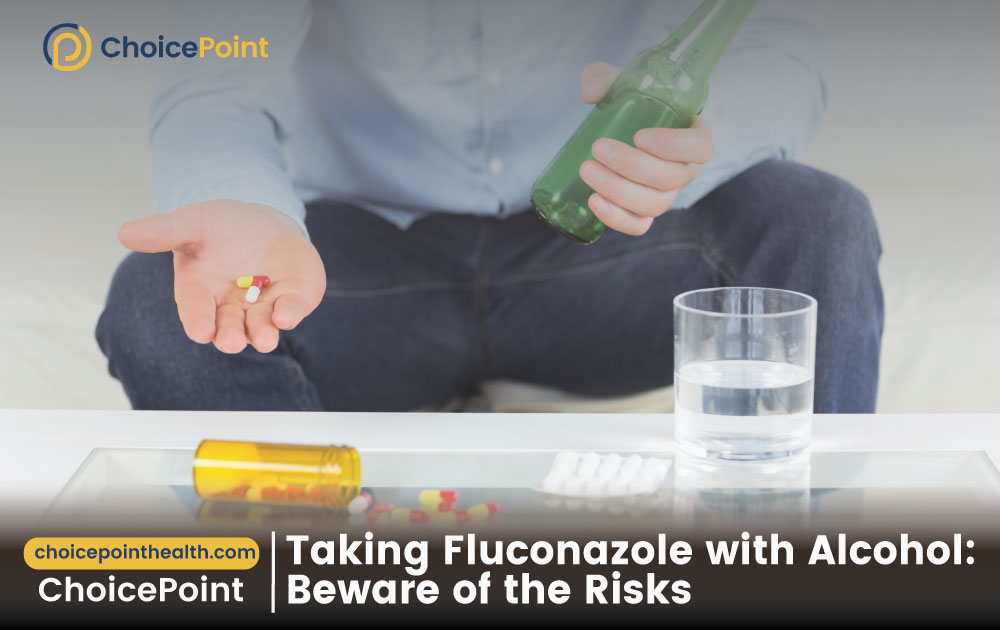Taking Fluconazole with Alcohol(Diflucan) can harm your health. The hazards and issues that could arise from drinking alcohol while taking fluconazole will be covered in this article. Awareness of these risks is critical to wise choices regarding your health and well-being.
Are you feeling lost and intoxicated all the time? Opt for our dual diagnosis treatment to address AUD and mental health issues. Dial 844.445.2563 or contact us through this form.
Table of Contents
Some Risks of Drinking Fluconazole
Chronic alcohol usage can strain the liver, affecting its ability to generate healthy new cells. In such a state, when you mix fluconazole with alcohol, it can affect the liver in many ways.
Hepatotoxicity Caused by Diflucan (Fluconazole) Alcohol Combo
Hepatotoxicity means liver toxicity which can be caused by damage to the liver. One of the fastest ways the liver is damaged is through excessive alcohol abuse. Both alcohol and fluconazole contribute to hepatotoxicity on their own as well. Numerous symptoms show that you are a victim of hepatotoxicity:
- Weariness
- Nausea
- Jaundice
- Abdominal discomfort
- Yellowish skin
- Dark-colored urine
If any of these signs appear, get in touch with your healthcare provider so that the damage can be controlled. Clinical studies show that after patients stopped taking diflucan due to liver toxicity, it took three to four months to recover from the loss completely.
Did you know that alcohol can cause a variety of liver-related diseases? Yes, you heard that right. Contact us now to fight off alcohol addiction and continue your life normally.
Thrush and Alcohol: Relationship of Antifungals and Alcohol
Alcohol has been seen to cause oral thrush in individuals who consume it heavily. Usually, thrush happens to immunocompromised people, meaning they have a compromised immune system. Studies have shown that antifungal medications like diflucan do not work well in those with weak immune systems. In summary:
- Alcohol does not make diflucan ineffective for a casual drinker
- Diflucan may not eradicate an antifungal in some cases
- Heavy drinkers are more prone to getting an oral thrush
If a heavy drinker takes fluconazole with alcohol, addressing thrush may take a while.

Get Help with Alcohol Abuse
Allergy
When the immune system overreacts to a chemical, such as a drug, allergic responses known as anaphylaxis) may take place. This immunological response results in symptoms. Diflucan is known to cause allergic reactions. Even if they are rare, it is possible. Diflucan allergy symptoms can range in severity from moderate to severe and can include:
- Itching or hives
- Face, tongue, or throat swelling or itching
- Having trouble breathing
- Chest constriction or wheezing
- Unsteadiness or faintness
- Cold or fever
Taking alcohol when you react badly will only add to your problems. After using fluconazole, you should seek immediate medical assistance if you suffer any of these symptoms. A severe and occasionally fatal allergic reaction to fluconazole with alcohol is possible and very dangerous. Before beginning therapy with Diflucan or any other medicine, it’s crucial to inform your doctor about any known sensitivities or past allergic reactions to medications. Furthermore, taking it.
Risking your life with a substance use disorder is not worth it. Seek help today by calling a rehab center. ChoicePoint provides MAT, a holistic combo of medication and therapy. Call us now at 844.445.2563 or complete this form for proper treatment.
Affecting the Absorption of Antifungal Medication
More often than not, when your liver and kidneys are damaged due to chronic alcohol use, fungal infections are exacerbated with the intake of alcohol. Liver or kidney failure can affect how the body metabolizes and takes medications.
The FDA has already explained that this medication’s efficacy is affected by kidney problems. As for a normal person, Diflucan may be safe to use, but if you have a condition affecting your kidneys, ensure proper treatment. Also, due to compromised kidney functions, consuming fluconazole with alcohol may not be wise.
The best way is prevention. So, undergo our AUD treatment today to protect yourself from the curse of alcohol addiction. Don’t ruin your immune system.

When Should You Avoid Fluconazole?
Fluconazole Warnings When Taken with Alcohol
Despite being a well-tolerated drug, fluconazole comes with some warnings. You must look out for signs because it may cause long-term issues.
Adrenal Deficiency
Adrenal glands are responsible for various physiological responses of the body. In cases where individuals are critically ill or have their bodies weakened to a great extent, fluconazole and alcohol both can cause adrenal insufficiency. This may result in:
- Muscle weakness
- Stomach ache/abdominal pain
- Loss of weight
- Impact on appetite
In usual cases, fluconazole and alcohol together may not directly render a reaction, but in those with several other issues can cause adrenal insufficiency. Be careful when you take any of the substances together!
Delirium
In one of the studies, yeast infection has been shown to cause delirium in a patient with schizophrenia. When the patient was prescribed fluconazole, the patient exhibited the following symptoms:
- Forgetfulness
- Confusion
- Disorientation
Initially, the doctors could not identify it, but soon they realized that Diflucan induced delirium. Once the medication was stopped, the patient’s health improved within three to four days. In a state where a person is already vulnerable, and you take fluconazole with alcohol, it can result in a harmful situation you want to protect yourself from.
Consistent alcohol use can lead to mental health disorders. AUD treatment can be lifesaving in many cases. Call us now at 844.445.2563 or fill out this form.
Should You Take Fluconazole with Alcohol? Bottomline
While fluconazole and alcohol will not interact with each other, let’s adhere to the age-old saying, “Prevention is the cure.” Taking alcohol when you have a fungal infection is synonymous with inviting fungus and allowing it to harbor in your body. If you are not an alcohol addict, you should be able to prevent drinking. However, if you have a drinking problem, you must seek help for AUD. This is because fluconazole with alcohol may not react adversely, but alcohol use has many fungal issues.
Medical Disclaimer:
ChoicePoint aims to improve the quality of life for people struggling with substance use disorder and mental health issues. Our team of licensed medical professionals research, edit and review the content before publishing. However, this information is not intended to be a substitute for professional medical advice, diagnosis, or treatment. For medical advice please consult your physicians or ChoicePoint's qualified staff.










Review Taking Fluconazole with Alcohol: Beware of the Risks.